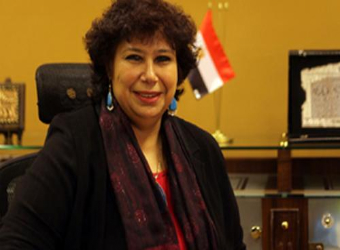Enas Abdel Dayem, former head of the Cairo Opera House, has been named Egypt’s new culture minister in Dr. Hazem El-Beblawi’s new interim cabinet.
Ms. Abdel Dayem announced that she will be sworn in next Wednesday July 17th, 2013.
Hazem El-Beblawi, following the military-backed roadmap instated after the overthrow of Egypt’s Islamist leader Mohamed Morsi on 3 July, is scheduled to hold talks with candidates for ministerial posts in the coming two days.
Over the last few months, Cairo Opera House has been a battleground between supporters and opponents of Egypt’s Islamist president, fighting over the direction of the Middle East’s oldest music institution.
Opera House Crisis
The former culture minister Alaa Abdel Aziz assigned during Mr. Morsi’s tenure, had fired the head of the opera house, part of a shake-up that was aimed at injecting “new blood” across art and culture programs that he said were stagnant and corrupt.
Following Abdel Aziz’s decree, opera house staffers were refusing any other boss to replace Enas Abdel-Dayem. They staged a series of protests outside her office, accusing Abdel Aziz’s of bending to pressure from Islamists, and some held a sit-in overnight to prevent any replacement from entering.
Staffers have also closed the curtain on all performances. For the first time in the opera house’s history, the opera Aida – composed by Giuseppe Verdi and debuted to the world in 1871 in Cairo – was canceled in protest.
Singers instead held posters on stage that said, “No to Brotherhoodization.”
“In a stand against a detailed plan to destroy culture and fine arts in Egypt, we decided as artists and management to abstain from performing tonight’s opera Aida,” conductor Nayer Nagi announced from the stage following the sacking decree. He vowed the halt would go on until Abdel-Aziz is removed.
Solidarity with Abdel Dayem
The staffers’ fears were fueled by comments by an ultraconservative lawmaker in parliament this week. The salafi Al-Nour Party member Gamal Hamid called for the abolition of ballet performances in Egypt – which are usually held at the opera house – describing it as “immoral” and “nude art.”
Abdel Dayem, who had been appointed about 15 months ago, months before Morsi’s election, said she was given no reason for her removal. Though told to vacate her office in 24 hours.
“There is a particular policy he’s using to eradicate Egyptian identity and culture,” she said of the minister Abdel Aziz “He is coming in crashing head-on. Before he even knows what these agencies do, he immediately started requesting to cut down on fine arts activities.”
The opera house staff has so far stood in solidarity with Abdel Dayem.
Opera singer Reda Wakil announced that the culture minister approached him to replace her but he refused and said the move was aimed at dividing artists. Members of the opera say the minister then turned to a stage craft engineer. The ministry has not commented on a next in line.
Composer and pianist Omar Khairat, who has played in sold-out performances across the world, also canceled his show at the opera house in solidarity.
Nagi, the conductor, told AP the decision to fire Abdel Dayem was “weak and stupid.” He accused the Brotherhood of being behind the move.
Manal Mohyieddin, a longtime harp player for the opera, said the situation in the ministry was an “embarrassment” for Egypt.
“This is not just about the Opera House,” she said. “We are talking about a nation that is being occupied by a political trend that calls itself Islamic, but it has nothing to do with Islam and does not represent Islam.”


